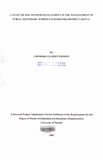| dc.description.abstract | To be effective, school administrators require support from the community which forms the school's catchment area. This support could be fmancial, moral or religious. But, however well intended the support is, it could be a source of strife if the providers of support do not observe the boundaries within which they should operate. This study set out to investigate sponsor support and what possible effect it may have on school management.
To this end, the study aimed at finding out the extent to which the sponsor was involved in providing various forms of support; to determine the level of sponsors' involvement in management of schools; to identify existing areas of conflict between the sponsor and other educational stakeholder; to establish the existing relationship between the sponsors and these stakeholders and to suggest ways of smoothening sponsor involvement in the effective management of public secondary schools.
The research questions were formulated in line with the aforementioned objectives. The literature review looked into the legal provisions for sponsors' involvement in school management, the history of sponsor involvement in school management and the problems likely to arise from unclear policy. From the literature review conceptual framework was developed.
The research design employed was the survey design. All the public sponsored secondary schools in Koibatek District participated in the study. Three questionnaires were used to collect data and their validity was established as adequate. The average questionnaire return rate was 92.6%. Data from the questionnaires was analysed and interpreted using descriptive statistics which included percentages and frequencies.
In answering the research questions, it was found out that only half of the schools had a pastoral care programme despite the provision of religious education being the main purpose of the sponsor. The education qualification of the chaplains was not up to standard. As pertains to sponsor's adherence to the stipulations of the Education Act,
sponsors generally flaunted the rules by insisting that their person of choice be installed as headteacher instead of merely recommending and by being involved much more closely in academics than was required of them.
Further, the sponsor's involvement in selecting members to constitute the BOG, and their participation in the proceedings of the Board were applauded, but they were overstepping the boundaries when they took part in student admission.
Several areas of conflict were identified and mainly blamed on the ambiguity of the stipulations about the sponsors' role in the Education Act. Such conflicts were in the areas of appointment of headteachers, matters of faith and in the use of school facilities. Despite these conflicts that negatively affected effective school management and thereby the education quality, the relationship between the headteachers, the AEOs and the sponsor was rated as cordial.
All the three groups of respondents had various suggestions to make to streamline sponsor involvement in education management in schools. Among the most favoured was the clarification of sponsors' role in the legal education frameworks, scrapping church sponsorship of public schools; sponsors' increased financial support to the institutions they purport to sponsor and the involvement of church sponsors in religions matters only.
Some of the conclusions arrived at; the sponsor did not adequately provide religious education to the schools; and that the sponsor's role in school management as provided by the Education Act and other education frameworks was glaringly unclear. In addition, the study made a few pertinent recommendations like the clarification of the Education Act and ceasing church sponsorship in public institutions. Lastly, areas for further research have been suggested and this includes the need to investigate the community's perception of the role of the sponsor in public secondary schools. This will generate more information for conflict-free sponsor involvement in school management. | en |

